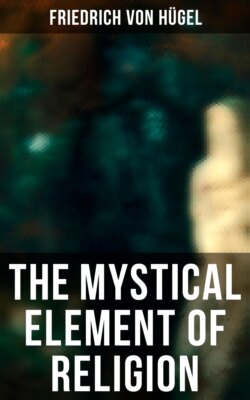Читать книгу The Mystical Element of Religion - Friedrich von Hügel - Страница 50
На сайте Литреса книга снята с продажи.
2. Co-existence and succession of the Three Elements in history generally.
ОглавлениеThe human race at large has evidently been passing, upon the whole, from the exterior to the interior, but with a constant tendency to drop one function for another, instead of supplementing, stimulating, purifying each by means of the other two.
If we go back as far as any analyzable records will carry us, we find that, in proportion as religion emerges from pure fetichism, it has ever combined with the apprehension of a Power conceived, at last and at best, as of a Father in heaven, that of a Bond with its brethren upon earth. Never has the sacrifice, the so-to-speak vertical relation between the individual man and God, between the worshipper and the object of his worship, been without the sacrificial meal, the communion, the so-to-speak lateral, horizontal relations between man and his fellow-man, between the worshippers one and all. Never has religion been purely and entirely individual; always has it been, as truly and necessarily, social and institutional, traditional and historical. And this traditional element, not all the religious genius in the world can ever escape or replace: it was there, surrounding and moulding the very pre-natal existence of each one of us; it will be there, long after we have left the scene. We live and die its wise servants and stewards, or its blind slaves, or in futile, impoverishing revolt against it: we never, for good or for evil, really get beyond its reach.
And yet all this stream and environment of the traditional and social could make no impression upon me whatsoever unless it were met by certain secret sympathies, by certain imperious wants and energies within myself. If the contribution of tradition is quantitatively by far the most important, and might be compared to the contribution furnished by the Vocabulary to the constitution of a definite, particular language,—the contribution of the individual is, qualitatively and for that individual, more important still, and might be compared to the contribution of the Grammar to the constitution of that same language: for it is the Grammar which, though incomparably less in amount than the Vocabulary, yet definitely constitutes any and every language.
And there is here no necessary conflict with the claim of Tradition. It is true that all real, actual Religion is ever an act of submission to some fact or truth conceived as not only true but as obligatory, as coming from God, and hence as beyond and above our purely subjective fancies, opinings, and wishes. But it is also true that, if I could not mentally hear or see, I should be incapable of hearing or seeing anything of this kind or of any other; and that without some already existing interior affinity with and mysterious capacity for discriminating between such intimations—as either corresponding to or as traversing my existing imperious needs and instincts—I could not apprehend the former as coming from God. Without, then, such non-fanciful, non-wilful, subjective capacities and dispositions, there is for us not even the apprehension of the existence of such objective realities: such capacities and dispositions are as necessary pre-requisites to every act of faith, as sight is the absolute pre-requisite for my discrimination between black and white. Hence as far back as we can go, the traditional and social, the institutional side of religion was accompanied, in varying, and at first small or less perceptible degrees and forms, by intellectual and experimental interpretation and response.
